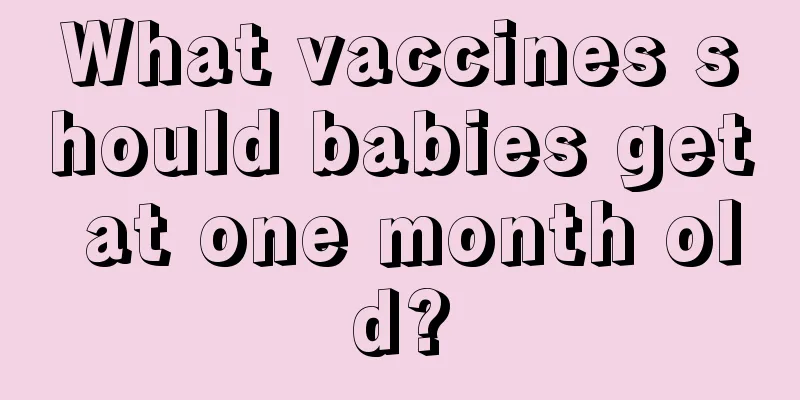What vaccines should babies get at one month old?

|
Many new parents do not understand many things about their babies because it is their first time being parents. They do not know what to do after the baby is born, what examinations the baby needs, or what vaccines the baby needs. The main purpose of vaccination for babies is to protect them and make them immune to certain diseases. Below I will tell you what vaccines your baby should get every month. You should read this carefully.
The vaccine that babies need to get when they are one month old is the hepatitis B vaccine. After the baby is born, hepatitis B vaccine and BCG vaccine are given. When the baby is one month old, he should get the second vaccine, which is the hepatitis B vaccine booster shot. The content of the injection is the same as the first shot, and the focus is on strengthening. 2. How many shots of hepatitis B vaccine does your baby need? The hepatitis B vaccine used in my country is an inactivated blood-derived vaccine, and just one injection cannot produce sufficient immune protection. The hepatitis B vaccine requires three injections, according to the 0, 1 and 6 month schedule. That is, after the first injection, the second and third injections are injected at 1 month and 6 months. Tips: 1. If the expectant mother is not infected with hepatitis B, the baby is generally injected according to the 0-1-6 method, that is, the second injection is given within 1 month after the first injection, and the third injection is given after 6 months. 2. For babies born to expectant mothers with hepatitis B, the vaccine should be injected once within one day, three months, and six months after the baby is born.
1. Local adverse reactions After babies receive the hepatitis B vaccine, a few local adverse reactions may occur, mainly redness, swelling, pain, and soreness at the injection site. This can be attributed to a short-lived inflammatory response. Parents and friends should not panic when facing these symptoms. Generally, these symptoms will disappear within 72 hours. If local redness and swelling and other reactions are severe, hot compresses can be used (but please note that hot compresses are strictly prohibited for redness and swelling after BCG vaccination). Parents should remember that each hot compress should not exceed 5 minutes. It is best to do it twice a day, once in the morning and once in the evening. After 1-2 days, the local adverse reactions will disappear. At the same time, you should pay attention to changing your underwear frequently to avoid purulent infection after the red and swollen areas rupture.
It is normal for babies to have a fever after vaccination, and the fever usually occurs one day after the vaccination. Fever is divided into three types: mild, moderate and severe. Mild fever is 37-37.5℃, and moderate fever is 37.6-38.5℃. Severe fever is above 39°C. Medication is generally not recommended for mild or moderate fever, which can be relieved on its own, and symptomatic treatment can be used when necessary. If the baby has a severe fever above 39°C, appropriate measures must be taken, such as taking antipyretics or sending him to the hospital for treatment in time. 3. Other adverse reactions In addition, some babies who have been vaccinated with hepatitis B vaccine will also experience symptoms such as nausea, vomiting, abdominal pain, diarrhea, and weakness in the limbs. Parents do not need to worry, as these symptoms will disappear in a very short time. |
>>: Can a newborn baby wash his face?
Recommend
What should I do if my baby has a fever of 39 degrees when teething?
We all know that teething is a relatively long pr...
What should I do if a male baby has scrotal fluid accumulation?
After the baby is born, some parents will find th...
Is it good or bad for babies to always sleep on their stomachs?
For little babies, their every behavior attracts ...
What to do when your child is fussy about sleeping
It is very tiring for mothers to take care of the...
What should I do if my 2-year-old baby can't sleep well at night?
For adults, sleep helps restore physical energy, ...
At what age do children lose their teeth?
Teeth play a very important role in our body. The...
What are the symptoms of developmental impairment in children?
Childhood is the best time for growth. If nutriti...
Why does a three-month-old baby have green stools?
Newborn babies are the apple of the family's ...
What is the reason for the red spots on the baby's palms?
Once a child has some health problems, parents ar...
Why does my child always want to urinate but doesn’t urinate much?
The symptoms of frequent urination are very commo...
3 reasons why babies blush in winter
When winter comes, many babies' pink faces tu...
The child is twitching, rolling his eyes and foaming at the mouth
Convulsions are a relatively serious disease, esp...
Treatment of baby's knee synovitis
Do you know what synovitis is? This kind of synov...
Baby care tips for new mothers
Whenever a new life comes, what follows is not on...
What to do if your 11-month-old baby has repeated fevers
The baby is the hope of the family and the future...









